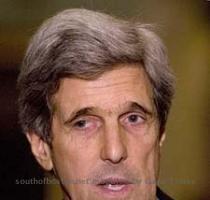Obama administration steps up aid to flood-ravaged Pakistan; hoping to improve relations
By Robert Burns, APWednesday, August 4, 2010
US stresses aid to Pakistan, eyeing improved image
WASHINGTON — The Obama administration is stepping up emergency relief for victims of Pakistan’s devastating floods, hoping a highly visible dose of goodwill will soften anti-American attitudes in a country seen as vital to defeating al-Qaida.
This comes at the same time a congressman who played a key role in revising the war strategy in Iraq in 2006 on Wednesday proposed an independent review of U.S. strategy and goals in Afghanistan and Pakistan.
These separate efforts reflect growing concern about the lack of apparent progress in the nearly nine-year conflict in Afghanistan, which has cost more than $297 billion and the lives of more than 1,100 U.S. troops.
Along with NATO, Pakistan is the key partner of the U.S. in the Afghan conflict. A Pew Foundation poll released last week that found nearly six in 10 Pakistanis view the United States as an enemy and only one in 10 call it a partner. Nearly two-thirds said they want American troops out of Afghanistan.
U.S. officials believe a major humanitarian response to a deadly 2005 earthquake in Pakistan boosted the U.S. image there, at least temporarily.
With the earlier experience in mind, the administration is trumpeting its contributions in the wake of the worst flooding in Pakistan in many years. Floodwaters have killed more than 1,500 people.
Secretary of State Hillary Rodham Clinton appeared Wednesday before the media to express America’s sympathy for the dead and displaced.
The U.S. government is rushing in helicopters to help with search-and-rescue efforts, she said, and is providing emergency medical assistance, ready-made meals and fresh water.
“We’ve been working hard over the past year to build a partnership with the people of Pakistan, and this is an essential element of partnership reaching out and helping each other in times of need,” she said.
Although the U.S. has given billions of dollars in aid to Pakistan since the 9/11 attacks, as part of a campaign to hunt down Osama bin Laden and destroy his al-Qaida network, the Pew poll revealed that many Pakistanis don’t realize it.
About a quarter of those questioned said the U.S. provides a lot of financial aid. Nearly a quarter said it provides a little aid, 10 percent said the U.S. gives hardly any, and 16 percent believe the U.S. gives Pakistan no aid.
Clinton’s spokesman, P.J. Crowley, said she met later with Sen. John Kerry, the Massachusetts Democrat who is chairman of the Senate Foreign Relations Committee, to discuss Pakistan, Afghanistan and other issues. Kerry recently has raised questions about U.S. goals in Afghanistan, as have many lawmakers worried by a stalemated conflict and a growing U.S. death toll.
Rep. Frank Wolf, R-Va., wrote a letter Wednesday reminding Obama that an independent review of Iraq strategy in 2006 came at a pivotal moment in that war, when mounting casualties and growing violence suggested to many that the cause was lost.
“I believe our nation is again facing such a moment in the Afghanistan war effort,” Wolf wrote.
Wolf proposed creation of an “Afghanistan-Pakistan Study Group” that would evaluate U.S. strategy in those countries and clarify the U.S. mission and goals.
Wolf authored legislation in 2005 that created a similar group to study U.S. strategy in Iraq, headed by former Secretary of State James Baker and former House Foreign Affairs Committee chairman Lee Hamilton.
Citing the urgency of the current situation in Afghanistan, Wolf urged Obama not to wait for congressional action but create an Afghanistan-Pakistan group by executive order. Wolf said he has canvassed the views of many senior diplomats, policy experts and military officers.
“Many believe our Afghanistan policy is adrift,” Wolf wrote, noting that all agreed on the need for a study group. “We must examine our efforts in the region holistically, given Pakistan’s strategic significance to our efforts in Afghanistan and the Taliban’s presence in that country as well, especially in the border areas.”
David Abshire, a retired U.S. ambassador who is president of the Center for the Study of the Presidency and Congress, said in an interview that Obama’s Afghanistan-Pakistan policy needs help.
“I don’t think we have a firm anchor at the end of our policy,” Abshire said, adding that Obama’s decision last December to send an extra 30,000 U.S. troops to Afghanistan has wide support, but many are uncertain what steps following the troop surge will be needed.
Tags: Afghanistan, Asia, Central Asia, Emergency Management, Iraq, John Kerry, Middle East, North America, Pakistan, South Asia, United States, Washington

